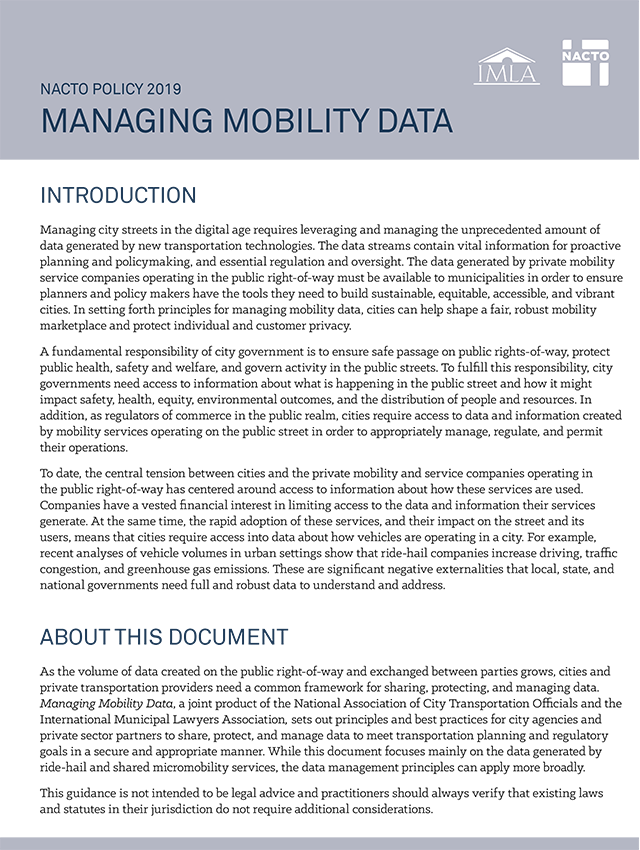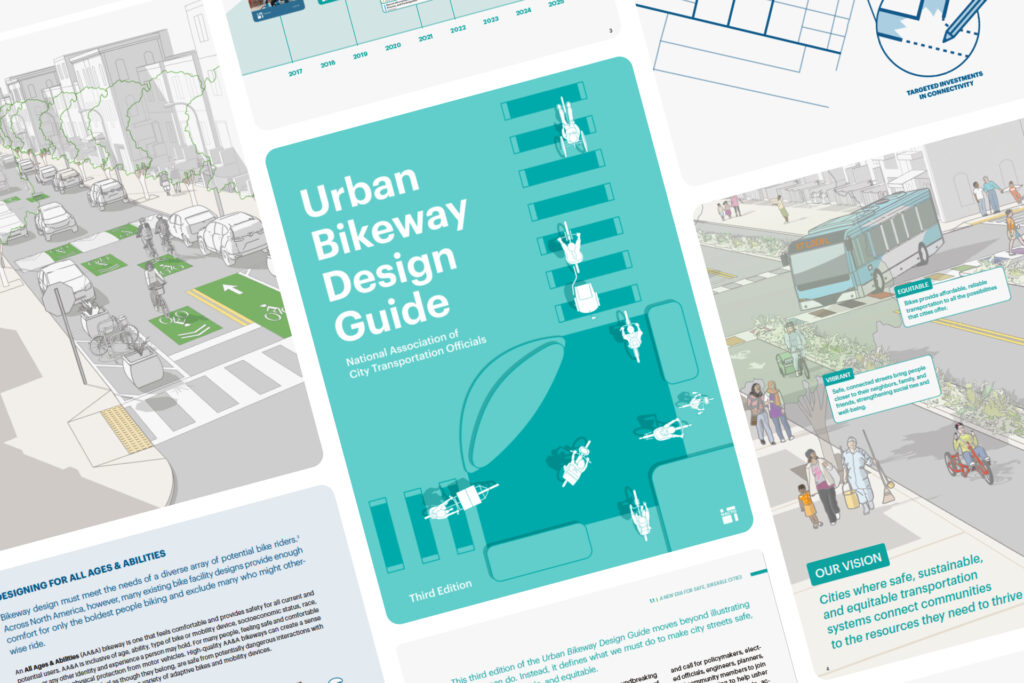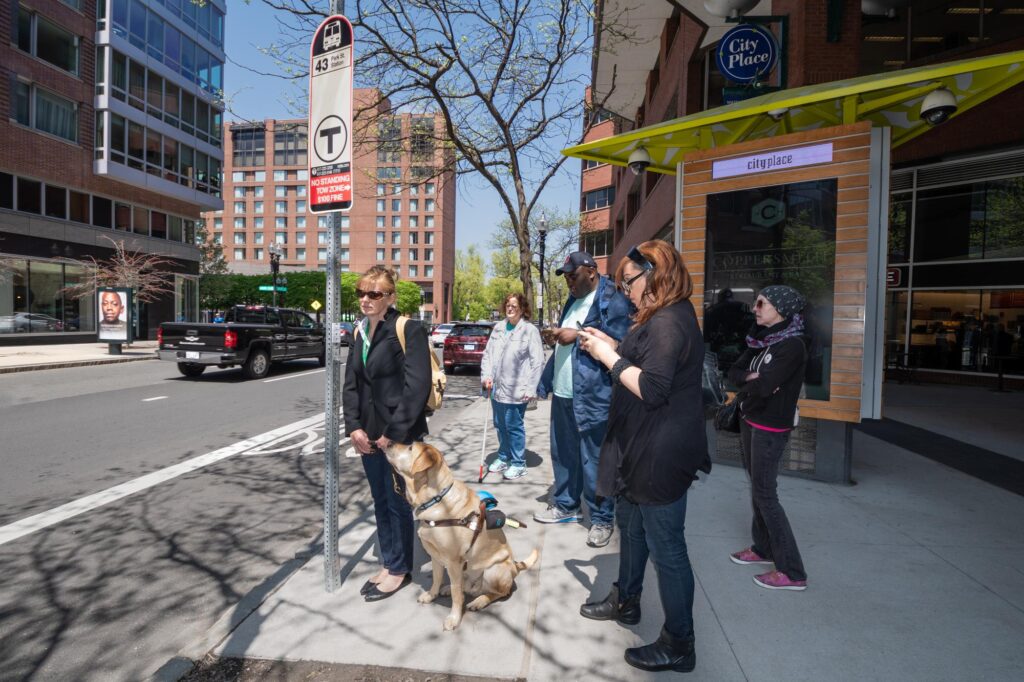As Mobility Services Proliferate in Cities, a Principles-Based Approach to Data Management Enables Cities to Ensure Essential Data Collection and Individual Privacy Needs Are Met

For Immediate Release | May 30, 2019
Contact: Alexander Engel | [email protected] | 646-324-2919
The National Association of City Transportation Officials (NACTO), an association of 82 major cities and transit agencies in North America, and the International Municipal Lawyers Association (IMLA), an association of local government attorneys, today released best practices for the access and management of mobility data, an increasingly-complex policy area with the potential to remake how city streets are managed.
As mobility service providers operating in the public realm (including Uber, Lyft, Bird, Lime, Waze, and other private mobility providers) capture increasing amounts of data, ensuring that data is appropriately collected and protected by cities and companies alike is an increasingly urgent concern. This data provides essential information that is at the heart of sound policymaking. At the same time, both cities and private companies must take steps to safeguard data and ensure that individual privacy—a foundation of democratic society—is protected.
NACTO and IMLA’s new policy guidance, Managing Mobility Data, provides a common framework for sharing, protecting, and managing data based on four principles:
- Data is a Public Good: Cities require data from private vendors operating on city streets to ensure positive safety, equity, and mobility outcomes on streets and places in the public right-of-way.
- Data Should be Protected: Cities and private companies should treat geospatial mobility data as they treat personally identifiable information (PII).
- Data Should be Collected Purposefully: Cities should be clear about when, why, and what data is necessary for planning, analysis, oversight, and enforcement purposes.
- Data Should be Portable: Open data standards help cities and private companies to share data in universal formats, enabling cities to use data from multiple sources, and supporting innovation in both the public and private sectors.
Managing Mobility Data provides guidance on how to ensure individual privacy as data collection becomes easier and more widespread. Mobility data, even when “anonymized,” can be easily traced back to individual users if precautions are not taken to appropriately manage and aggregate data. As recent data breaches and unintentional de-anonymization of data sets have shown, mobility data can be easily personally identifiable, and individual privacy is hard to maintain without robust frameworks in place to ensure data is appropriately stored, accessed, aggregated, and protected. Cities can take a number of common-sense approaches to reduce the risk of data being inappropriately accessed, used, or shared.
While written by and for cities, NACTO and IMLA’s guidance is built on principles that should be adopted by both the public and private sectors.
“Transportation today relies on digital infrastructure as much as on the physical infrastructure of streets, and as our travel histories move online, our digital security has become as important as traffic safety,” said Janette Sadik-Khan, NACTO Chair and Principal at Bloomberg Associates. “Managing Mobility Data gives cities a roadmap to balance the scales of modern mobility and privacy while harnessing the transportation data we need to design world class streets.”
“Cities must understand and manage the public realm to meet ambitious climate, safety, and equity goals,” said Seleta Reynolds, NACTO President and General Manager of the Los Angeles Department of Transportation. “In Los Angeles, we know data can inform better planning decisions and regulate private mobility services for public benefit. We released a ground-breaking data specification, MDS, that provides a transparent and reliable way to share information between the public and private sector. LA treats MDS data as personally identifiable information. Managing Mobility Data will help hold us and the companies we regulate, to the highest standards for protecting people’s fundamental right to privacy.”
“With the rise in new transportation options facilitated by online and app-based services, data security and management is imperative,” said Chuck Thompson, General Counsel and Executive Director of the International Municipal Lawyers Association. “Leveraging this data, using the principles outlined in NACTO and IMLA’s joint guidance, will allow cities to upgrade and streamline existing infrastructure and plan for future advancements in this area.”
“We’ve significantly improved transportation in Seattle through better mobility data,” said Benjamin de la Peña, Chief of Strategy and Innovation for the Seattle Department of Transportation. “We’ve lowered single occupancy vehicle rates and increased transit and bike use, all through the use of better-quality information. Continuing to ask the right questions, and gather real-time and accurate information with high-quality mobility data will help us to advance equity, to address transportation’s role in the climate crisis, and to deliver better projects faster.”
“NACTO and IMLA’s Managing Mobility Data policy document provides the missing standards needed for privacy protection and public-private data sharing, helping us protect personally identifiable information while encouraging innovation,” said Cordell Schachter, Chief Technology Officer/CIO for the New York City Department of Transportation. “When we share data, private and public sector entities need to use the most responsible, least-risky information technology practices. I look forward to developing new and improved relationships with my peers and commercial providers guided by the principles in NACTO’s document—supporting government’s mission to oversee the civic realm and the transportation marketplace.”
“The privacy issues posed by geolocation information cannot be underestimated, and NACTO and IMLA’s policy guidance is timely and essential as cities and companies gather more and more data about how individuals go about their days,” said Joseph Jerome, Policy Counsel at the Center for Democracy & Technology. “All entities that collect geolocation data need to acknowledge their responsibility to protect this information. NACTO and IMLA offer useful recommendations for cities thinking about what technical and policy guardrails to put in place around mobility data, ensuring the ability to use information while maintaining critical privacy protections.”
With thoughtful tools and principles, and by maintaining regulatory authority, cities can ensure positive outcomes with the collection and management of mobility data. Managing Mobility Data charts a path that increases public agencies’ access to data and information while strengthening privacy protections for individuals.
Download the policy document at nacto.org/managingmobilitydata
###
About the National Association of City Transportation Officials (NACTO)
NACTO is an association of 82 major North American cities and transit agencies formed to exchange transportation ideas, insights, and practices and cooperatively approach national transportation issues. The organization’s mission is to build cities as places for people, with safe, sustainable, accessible, and equitable transportation choices that support a strong economy and vibrant quality of life. To learn more, visit nacto.org or follow us on Twitter at @NACTO.
About the International Municipal Lawyers Association (IMLA)
The International Municipal Lawyers Association (IMLA) is a non-profit, professional organization that has been an advocate and resource for local government attorneys since 1935. IMLA services as an international clearinghouse of legal information and cooperation on municipal legal matters. IMLA collects from and disseminates information to its membership across the United States and Canada and helps governmental officials prepare for litigation and develop new local laws. To learn more, visit imla.org.



